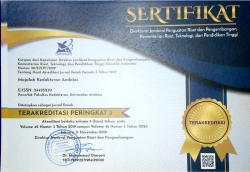RESPON Th2 PADA INFEKSI CACING USUS
Abstract
Abstrak
Penyakit kecacingan masih merupakan masalah kesehatan di beberapa negara berkembang termasuk Indonesia. Prevalensi penyakit kecacingan ini masih cukup tinggi terutama pada kelompok masyarakat dengan higienisitas dan sanitasi yang rendah.
Penyakit kecacingan ini disebabkan oleh organisme multi seluler yang mempunyai masa hidup panjang dan siklus hidup yang kompleks. Sepanjang siklus hidupnya, cacing usus mengalami perkembangan stadium yang yang dapat berpindah, melewati atau memasuki organ tertentu serta mampu memodulasi respon imun yang kuat dan khas pada hospes. Efek modulasi infeksi cacing terhadap sistem imun ini terjadi akibat perubahan keseimbangan T helper1/T helper2 (Th1/Th2) ke arah sel Th2 (Th2 palarized).
Pada infeksi akut cacing usus terjadi stimulasi respon imun hospes yang terpolarisasi ke arah sel Th2 yang dikenal dengan Th2 response. Polarisasi respon imun ke arah sel Th2 ini ditandai dengan peningkatan Th2 specific cyokines seperti interleukin-4 (IL-4), interleukin-5 (IL-5), interleukin-13 (IL-13) dan peningkatan imunoglobulin E (IgE). Pada infeksi cacing kronis terjadi modified Th2 response yang menekan produksi interleukin-5 (IL-5), mengaktivasi peranan sel Treg. Sel Treg ini menghasilkan interleukin-10 (IL-10) dan Transforming Growth Factor – β (TGF-β). IL-10 berperan dalam class switching antibody response dimana sel B yang sebelumnya memproduksi IgE menjadi memproduksi IgG4. TGF-β berperan dalam menekan respon seluler baik sel Th1 maupun Th2.
Kata kunci: Cacing usus, Th2 response, modified Th2 response
Abstract
Intestinal helminthiasis is still unsolved problem in developing countries including Indonesia. The prevalence is generally high particularly in bad hygiene and sanitation.
Intestinal helminthiasis are caused by human pathogenic intestinal helminth. This multicelllular parasite has long and complex life cycle. Helminth has stadiums which can move, pass through or enter certain internal organ and also modulate immune response. Intestinal heminth modulates immune response by skewing toward Th2 (Th2 polarized).
The immune response of the host to acute intestinal helminthiasis is characterized by Th2 response with production of cytokines interleukin-4 (IL-4), interleukin-5 (IL-5), interleukin-13 (IL-13), as well as elevated imunoglobulin E (IgE). In chronic intestinal helminthiasis, modified Th2 response reduce production
TINJAUAN PUSTAKA
95
Interleukin-5 (IL-5), activate Treg to produce high levels of IL-10 which switches B-cell responses from IgE to IgG4 and transforming growth factor-β (TGF-β), which mediates Th1 and Th2 hyporesponsiveness.
Key words: Intestinal helminth, Th2 response, modified Th2 response





















